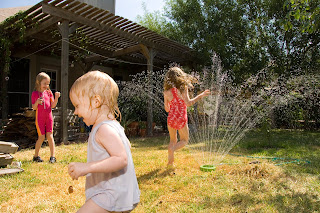 Benefits
BenefitsEnvironmental Benefit: ★★★★★
Over one-third of the energy requirements of most cities goes to water processing and treatment. With a large percentage of the average household's water requirement being spent for watering lawns, reducing your water usage is one of the best steps you can make to reduce your "footprint". Also, many of the nation's lakes and reservoirs are being rapidly drained, and rivers going dry due to our national thirst for water resources. By carefully considering the needs of the plants you tend, they will be healthier for not being over or under-watered.
Money Saved: ★★★★★
Depending on where you live, water bills can be quite significant - especially during drought conditions. Saving water makes a real impact on your pocket book. Our water bill in Austin Texas is about $15 in the winter and $40 in the summer for a family of 6! Note that this is with a year-round garden taking up much of the back yard also! We also take other water conservation measures which I'll write about separately, but this is a big one. Keep in mind that water companies usually charge a separate lower rate for the first 2,000 or so gallons used each month, and then a higher rate for anything above that. So your savings may likely come right off the higher rate!
Lifestyle Benefit: ★★☆☆☆
It admittedly isn't that fun to hand-water. You can save some time by placing sprinklers where needed and then leaving them to run, but be sure to use a timer to remind you when they're done (or you'll forget and potentially leave them going overnight!). So I'd give this just one benefit star here, except that there are actually a number of side benefits to consider! By spending more time close to your plantlife, you'll see the areas that are having problems and react sooner to take care of weeds, pests, and fungus. You'll avoid overwatering, which is considered the most common cause of death for household plants! Watering can also be a rather peaceful, meditative activity. Who doesn't remember a little of the fun you had as a kid with a watering hose! And saving money on water bills means more $$$ in your bank account, which is certainly a lifestyle benefit! So this gets two solid gold stars despite the extra effort required.
What We're Doing

Most people water their lawns and gardens WAY too much. If you have an automatic system, then it probably doesn't take into account how much rain you've had recently or how much you're expecting tomorrow. A sprinkler head might be broken and gurgling thousands of gallons away onto the sidewalk before you notice it. The timer won't notice when the ground has gotten drenched and sodden (also making it susceptible to fungus). Hand watering, although certainly more labor intensive, makes it much easier to intelligently water your lawn where it needs it and when it needs it. Overwatering promotes shallow root systems, so the lawn actually needs more water to keep it healthy. To tell the truth, we haven't watered our front lawn (which is mostly shaded during the day) since two years ago when we had a prolonged drought. The grass wouldn't win any neighborhood beauty prizes, but it's alive and relatively healthy even in our 100 degree summer climate because we mulch it (which holds the moisture in) and only water when it hasn't rained in quite awhile (to develop good roots and prevent fungus). When you do water, the best times are in the morning or evening, when the low sun allows water to soak in before evaporating. You can also do "multipurpose" watering as shown in the photo, using the sprinkler as a fun activity for the kids! An alternative to hand watering garden and landscaping plants is to use a drip irrigation system, which dribbles water directly onto the ground near each plant while your watering timer is active. Be aware of what your flow rates are (you can get a flow controller for your line) and research the requirements of your plants. Adjust the water you provide based on their real needs and you'll save money and have healthy plants! Yes, it requires more effort than a set-and-forget watering system, but your plants will appreciate not being "neglected"!
Tips
We've used a wireless rain gauge for several years. It's fun to be able to go over to the wall and see the current rainfall rate when you're in a heavy downpour. The measuring device was solar powered which we thought would be great since it wouldn't need battery replacements. However, unfortunately the plastic they are made from (like most plastics) degrades in the sun fairly rapidly. Once the plastic cracks the water gets into the electronics. We've had to replace it several times, and after the most recent failure I got the following glass (not plastic) cylinder "low tech" replacement for Shannon. She records the daily rainfall in her garden journal anyway, so it really isn't more work for her to check it here than on an electronic gauge. Unless it breaks, this gauge should last a lot longer and it was much cheaper! You'll get much more accurate rainfall measurements by making them yourself rather than relying on your local weather channel. What you get in your yard can vary quite a bit from what they record at their measuring stations!

A Little Humor
God made rainy days, so gardeners could get the housework done.
Gardening requires lots of water - most of it in the form of perspiration.- Lou Erickson

No comments:
Post a Comment